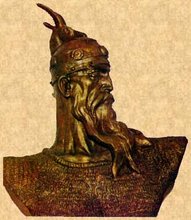(Article from newkosovareport.com)
**************************************************************
| Chinese and other immigrants call Kosovo home |  |
| Monday, 21 July 2008 | |
 In one of the neighborhoods of Prishtina, Kosovo, among many other discount stores, there is the store of the Chinese immigrant Lili. In one of the neighborhoods of Prishtina, Kosovo, among many other discount stores, there is the store of the Chinese immigrant Lili. The uniqueness of her discount store is found within the colorfully painted ornaments of mythic Chinese dragons, hanging high all over the store's ceiling, purposely to draw the attention of the customers. Lili, the saleswoman at the store, is only 20 years old. Born in China, she has been living in Prishtina with her family for the last five years. "I live in Kosova with my family. I like living among Kosovar people; they are peaceful, energetic and tolerant. My legal temporary immigration papers issued by the Kosova authorities give me permission to live and work here,” says Lili speaking in broken Albanian language with a heavy Chinese accent. To retain her legal temporary employment and residence in Kosovo, Lili explains how she has been continuously in contact with the authorities. She also has a temporary residential card with the work permit. Because she loves living in Kosovo, Lili plans to apply for Kosovo permanent residency. The capital of Kosovo is not her first residence since she moved out of China. After many clandestine traveling around Asia and Eastern Europe looking for a better life, her family had finally decided to settle down in Kosovo. After 1999, Prishtina's shopping centers expanded. Today, among many established business stores run by immigrants, Chinese and Indian shopkeepers are notably the largest. Incidentally, many citizens of Prishtina have already dubbed a section of the city as the future 'Chinatown'. It is not only Lili's family that has chosen Kosovo as their new home. In the recent years and months, Kosovo has become a new residence for immigrants from many countries. The recent statistics on immigration, published by the Department of Migration and Foreign Resident Services, shows that during 2007, the largest numbers of immigrants were Turks, Chinese, Bulgarians and Indians. Legal procedures to enter the Republic of Kosovo are very simple. There is no specific immigration law yet, so a visa is not required. The only requirements are a valid passport and a sponsor who is a citizen of the Republic of Kosovo and can guarantee the residential accommodation along with employment. Refki Morina, the director of the Department of Migration and Foreign Resident Services, says that "until now the department would issue only a 90-day temporary residence stamp on a required valid passport. Fifteen days before expiration of the temporary residence stamp, foreigners were required to apply for a temporary immigration residential card, explaining the reasons why they want to reside in Kosovo. If temporary immigrants do not respond within 90 days, fines, jail and deportation come into effect and losing the permission to enter Kosovo for a minimum of 3 years to permanently, depending on the case." The new immigration bill which with follow European Union guidelines, was introduced by the government and is expected to be voted soon by the Parliament of the Republic of Kosovo. The Immigration Law will allow foreign residents who have lived for over 5 years in the Republic of Kosovo to apply for permanent resident status. Procedures included in such applications are fingerprints, an interview and the background check. For citizens of certain countries, to enter the Republic of Kosovo the law will require a visa, issued by the proper embassy. Fisnik Rexhepi, adviser to the Minister of Interior Affairs of the Republic of Kosovo, says: "The issue of visas to enter Kosovo will be regulated under a law which will determine whether the citizens of that country will need a visa. Once the law comes into effect, we will inform the respective authorities of all countries." |





















4 comments:
Michael Totten has published a series of reports on
Kosovo:
http://www.michaeltotten.com/archives/2008/07/an-abominable-b.php
http://www.commentarymagazine.com/viewarticle.cfm/this-is-a-kosovar-muslim-11372
https://www.commentarymagazine.com/viewarticle.cfm/the-israel-of-the-balkans-11266?page=all
http://www.michaeltotten.com/archives/2008/07/the-bin-ladens.php
Sarajevo:
http://www.michaeltotten.com/archives/2008/06/a-dark-corner-o-1.php
Belgrade:
http://www.michaeltotten.com/archives/2008/06/a-dark-corner-o.php
Now another article from Michael Totten, on Macedonia :
http://www.michaeltotten.com/archives/2008/07/the-bin-ladens-1.php
Please make comments on the New Kosova Reports website :-)
http://docs.google.com/Doc?id=dc2m8p62_246hgmvxpcf
http://pasta.cantbedone.org/pages/EL5zuV.htm
http://lnk.nu/greatersurbiton.wordpress.com/mxu/
Rejecting false parallels: Why Kosovo is not South Ossetia (or Abkhazia or Transnistria or northern Cyprus…)
Marko Attila Hoare, Greater Surbiton, 29 November 2007
We are all familiar with a certain dishonest rhetorical tactic: the use of an argument that is objectively ridiculous and that the person making it knows is ridiculous, but that nevertheless can sound impressive to the ears of someone who does not pause to think twice about it. A good example is the claim that we should not recognise Kosovo’s independence lest it set off a chain reaction across the world, with secessionist territories rushing to follow Kosovo’s example by declaring independence. Former Serbian foreign minister Vuk Drašković suggested these would include northern Cyprus, the Basque country, Corsica, Northern Ireland, Scotland, South Ossetia, Chechnya and Taiwan. A superficially more sophisticated older brother of this argument is the one made by Russian President Putin and his supporters: that if Kosovo is allowed unilaterally to secede from Serbia, the same right should be accorded to the Russian-backed breakaway territories of Abkhazia and South Ossetia (formally parts of Georgia) and Transnistria (formally part of Moldova). Both of these arguments are sophisms, and it is worth pausing for a moment to understand all the reasons why.
We can start by rejecting the obvious falsehood that recognising Kosovo’s independence without Serbia’s consent would be an irresponsible act of radicalism equivalent to Prometheus’s revealing the secret of fire to mankind or Pandora’s opening of the box. Unilateral declarations of independence - and unilateral recognition of the independence of secessionist territories by outside powers - are part and parcel of the modern world. It is enough to mention France’s recognition of the independence of the United States in 1778, Britain’s recognition of the independence of Bangladesh in 1972 and Germany’s recognition of the independence of Croatia in 1991 - all of them without the consent of the country against which the wars of American, Bangladeshi and Croatian independence had been fought. None of these actions led to global chaos. Recognising Kosovo’s independence without Serbia’s consent is hardly an action without precedent in international relations.
Nor is it true that the world is covered by dozens or hundreds of potentially separatist territories, all eagerly watching to see what happens with Kosovo before deciding whether themselves to follow its example. We know this is not true, because several of the territories that are usually cited - South Ossetia, Abkhazia, Transnistria and northern Cyprus, in particular - have already unilaterally seceded from their parent countries. The Turkish Republic of Northern Cyprus formally declared independence in 1983, years before Kosovo attempted to secede from Serbia. Anyone with any knowledge of the chronology of historical events in greater south-eastern Europe knows perfectly well that the acts of secession in question were not in any way inspired by events in Kosovo. In the cases of South Ossetia, Abkhazia and Transnistria, the obvious precedent, in the eyes of the secessionist leaderships, was the secession of the constituent republics of the USSR, to which was coupled their own reluctance to be left in an independent Georgia or Moldova.
Secessionist leaderships, in other words, choose the precedents that suit them. Those South Ossetians, Abkhazians and Transnistrians seeking precedents can cite the recognised secession of Lithuania, Azerbaijan, Croatia, Montenegro, etc. If Kosovo is recognised, they will be able to cite Kosovo as well. But nobody should confuse rhetoric and propaganda with genuine motivation. And it is particularly comical to hear the Russian leadership voice its ‘fears’ of Kosovo setting a precedent, when it was the Russians whose military intervention enabled South Ossetia, Abkhazia and Transnistria to break away from Georgia and Moldova in the first place. That the Russians continued to support the secessionists in question while crushing Chechnya’s bid for independence should be enough for us to dispense with the illusion that their arguments over Kosovo have anything to do with principles over consistency and precedent-setting. They could, if they wish, respond to our recognition of Kosovo’s independence by recognising formally the independence of their Transnistrian and South Caucasian clients - as Turkey has recognised northern Cyprus - but nothing forces them to do this, certainly not their infinitely malleable ‘principles’.
This brings us to the question of whether Kosovo really is fundamentally different from those secessionist countries that we have already recognised - Slovenia, Croatia, Latvia, Georgia, Montenegro, etc. - and fundamentally similar to those we have not - South Ossetia, Abkhazia, Transnistria, Nagorno Karabakh, etc. The answer on both counts is, simply, no. Kosovo is different from the latter territories in terms of its status in the former federation to which it belonged: it was - like Croatia, Slovenia and the other former Yugoslav republics - a constituent member of the Yugoslav federation in its own right. By contrast, Abkhazia, South Ossetia and Nagorno Karabakh were not constituent members of the former Soviet Union. Transnistria was not even an autonomous entity at all. If one applies consistently the principle that all the members of the former federations of the USSR, Yugoslavia and Czechoslovakia should have the right to self-determination, then this right belongs to Kosovo.
Furthermore, when Kosovo joined Serbia in 1945, it did so formally of its own free will, by a vote of its provincial assembly. Kosovo was, before Slobodan Milosevic’s abrogation of its autonomy in the late 1980s, already effectively independent of Serbia, which was a composite republic consisting of the two autonomous provinces of Kosovo and Vojvodina and so-called ‘Serbia proper’ - each of which was a member of the Yugoslav federation in its own right, independently of the other two. There is absolutely no reason why the international community should, given the collapse of this federation, automatically assign Kosovo to the possession of an independent Serbia. Since Kosovo joined Serbia in 1945 on the understanding that it was simultaneously part of Yugoslavia, the only reasonable course of action would be to permit Kosovo’s assembly to decide what its status should be in the new circumstances. These new circumstances were, let us not forget, created by the leadership of Serbia’s deliberate and successful campaign to break up Yugoslavia and deprive all Yugoslavs - including the Kosovars - of their common homeland.
Not only is Kosovo not equivalent to Abkhazia, South Ossetia and Transnistria in legal and constitutional terms, but it is not equivalent to them in other respects either. With roughly two million people, Kosovo has a resident population roughly four times the size of Transnistria’s, ten times the size of Abkhazia’s and thirty times the size of South Ossetia’s. It has a larger population than several independent European states, including Estonia, Cyprus, Malta and Iceland (about five times the population of Malta and seven times the population of Iceland, in fact). Furthermore, Kosovo’s population is overwhelmingly Albanian and supportive of independence, and was so even before the exodus of non-Albanians following the Kosovo war in 1999.
By contrast, Abkhazia’s largest nationality was, until the ethnic cleansing operations of the early 1990s, the ethnic Georgians, who outnumbered ethnic Abkhaz by two and a half times, who comprised nearly half the population of Abkhazia and who oppose independence. In South Ossetia, ethnic Ossetians outnumbered ethnic Georgians by two-to-one; still, an independent South Ossetia would be considerably smaller in terms of population and territory than any independent European state except for mini-states like Monaco, Liechtenstein and San Marino. Were their independence recognised, Abkhazia and South Ossetia would in practice become parts of Russia; a vast state would thereby have expanded its borders at the expense of a much smaller state (Georgia). As for Transnistria, its population is somewhat larger than Abkhazia’s or South Ossetia’s, but Moldovans who oppose independence comprise the largest nationality, albeit outnumbered by non-Moldovans two-to-one. And as we noted above, Transnistria’s claim to independence on constitutional grounds is even weaker than Abkhazia’s or South Ossetia’s. One could make a case for the independence of any of these territories, but in terms of constitutional status, population size, national homogeneity and viability, Kosovo’s is by far the strongest.
Modern European history has witnessed the continual emergence of newly independent states that successfully secede from larger entities: roughly in chronological order, these have been Switzerland, Sweden, the Netherlands, Portugal, Greece, Belgium, Luxemburg, Serbia, Montenegro, Romania, Norway, Bulgaria, Albania, Poland, Finland, Czechoslovakia, Ireland, Iceland, Cyprus, Malta, Lithuania, Latvia, Estonia, Georgia, Armenia, Azerbaijan, Ukraine, Belarus, Slovenia, Croatia, Macedonia, Bosnia-Hercegovina, Slovakia, the Czech Republic and Montenegro (for the second time). There are, of course, many countries or nations that have failed to secede, or whose secession has not been recognised internationally. The merits of any particular claim to self-determination have to be judged on their own basis.
In supporting Kosovo’s independence, both justice and as many precedents as we care to pick will be on our side. And we can safely ignore the sophisms put forward by hostile governments against us.
This article was published on the website of the Henry Jackson Society.
Possibly related posts: (automatically generated)
* Georgian PM rejects Kosovo parallel
* South Ossetia sends busloads of children to Russia
* Separatists say 6 dead in fighting with Georgia
Taiwan already is independent, and is recognized as such and treated as such the world over, for a very long time. However, nations are just carefuly not to "formally" refer to this independent nation as an independent nation, as not to anger mainland Chinese imperialists.
Post a Comment